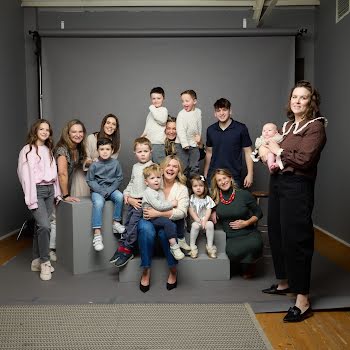Unsplash
How do you bridge the gap between new parents and the childfree?
Parents and childfree people tell Roe McDermott about how their friendship has changed after kids entered the picture – and what they wish their friends understood.
When two of my favourite people announced they were expecting a baby together, I was thrilled for them – and terrified. As the youngest in my family and among the youngest of all my cousins, I don’t have a lot of experience around babies. I was well aware that I had no idea what new parents need – which might translate into me being a crap friend to them. And while I’m currently happily childfree, it frankly seems like everyone around me is getting pregnant and raising tiny humans and I live in fear of being the friend who is slowly left out of gatherings or worse invited, only to have parents roll their eyes at my cluelessness and talk amongst themselves about how useless I am.
While I may not intuitively know what new parents need, I am good with instruction and acts of service and gift-giving are my love languages. Give me some snacks and flower preferences and I’ll deliver them on the regular. Tell me what’s helpful and I’ll do it when possible. Give me clear communication and I’ll make sure we flourish.
But increasingly, when speaking to my friends with children and my friends without, I’ve noticed that there’s often a big gap in communication around changing needs, expectations and feelings. Parents don’t feel like their childfree friends “get it” – but also aren’t great at clearly expressing their needs. Childfree people feel ignored and patronised, but don’t try to brainstorm with their friends about ways that they can still feel acknowledged. And in this gap between what people need and what they actually say out loud, misunderstandings and resentments can form.
So I asked parents and childfree people what they wished the other understood, in the hopes of creating more understanding between friends, and to craft a list of helpful, tangible tips so everyone can be better friends to each other – which is what everyone wants. We’re all muddling through and sometimes messing up – but through being honest, maybe we can start muddling through together.
Making parents’ lives easier, not harder
“I’m just not in host mode. I’m in survival mode. I’m making snacks and cleaning up after people all day. Don’t add to my list. Help.” — Ruth, a mother of two.
Cat is American and has a baby, now one. While she wants to see her friends, Cat says she needs them to recognise how limited her energy and how much is constantly being asked of her – and so to please not add any work to her over-filled plate.
“With a kid, I wish my friends understood my brain is essentially dead at every moment of every day,” she says. “So if they are staying at my home with me I need them to feed themselves and do whatever they need to do as an adult to care for their own needs. It isn’t that I don’t want to help them, I really do, but my brain isn’t even functioning enough for me to remember I haven’t eaten since yesterday let alone figure out how to answer all their questions about if they can borrow my hairbrush or eat my peanut butter.
“Do whatever you want, just take care of it without asking me questions. I need you to be a fully self-sufficient adult when you are visiting me and that means helping yourself to anything at all without asking me if you can use it. Don’t ask me any questions at all. I am barely able to focus on the basics of my baby, who I am constantly learning how to care for. I don’t get to my own needs, there is zero way I have two brain cells to rub together to answer any question you would have — the most polite thing to do is just dive in and help yourself. You know what to do.”
Ruth, who has two children, the youngest under two, is in full agreement with Cat.
“I love my friends and want to see them, and really appreciate when they come to me instead of asking to meet out somewhere. But when you come over, please bring something or clean something. Make your own tea and if you want snacks, bring them. That sounds awful,” Ruth groans, “but I’m just not in host mode. I’m in survival mode. I’m making snacks and cleaning up after people all day. Don’t add to my list. Help.”
Ruth also wishes her friends would do more short visits, rather than long ones.
“Before I had kids, we used to hang out for hours and of course I miss that, but it’s just not possible now,” she says. Ruth says her friends keep trying to arrange nights out or long Sunday brunches which she can’t do. “I’d love to see them more often for twenty minutes or half an hour. That way, we can keep connected and we get to catch up. I’m getting a regular dose of adult conversation which I need for my sanity — but it’s not disrupting the routine too much.”
I ask if Ruth has heard the term “errand friend”, referring to friends who are comfortable accompanying each other doing boring life maintenance like grocery shopping or going with each other to appointments. She lights up. “Oh my god, that would be great. Like, I know it’s boring but I have so much stuff to do. I’d love if one of them just came to the shops with me so we could catch up while I’m getting bits.”
I ask whether she’d feel comfortable asking her friends to do that and she immediately balks. “We never really had that relationship. We went out, or we went to each other’s houses. And I feel like—” Ruth pauses and sounds sad. “I’m scared they already think I’m so boring that asking them to spend their time doing really boring stuff would be worse.”
That’s part of the reason that Ruth finds it easier to be friends with other mothers. “There’s just an understanding there. They get that you have to be boring. That fear of disappointing people isn’t there as much.”
Ruth perfectly encapsulates one of the issues facing people navigating friendship after one of them has kids; often the things that would be the most helpful (like accompanying parents on errands so they can double-duty responsibilities with friend time) go unspoken.
When life circumstances change, it’s vital to address how the relationship needs to adapt accordingly, even if it means asking to change the way you spend time together. Running errands could be one new possibility. For most parents, late nights or even early evening hangouts are now out due to bedtime routines — but they’re wide awake early in the morning, making weekend breakfast or brunch visits much easier to accommodate. This may feel obvious to parents, but for childfree people who never saw their friends before 7pm in the times B.C. (Before Children), they may believe that inviting themselves over for breakfast could be intrusive and unwanted. Expressing these changing needs and preferences clearly and explicitly can help childfree people know what to offer.
Jon is a father to a girl and a boy and says he’d love it if friends visited more — with naps and feeding and bedtime routines it can be hard to get out of the house sometimes, so having people pop over is the best.
“In my experience, people don’t want to visit or feel like they can’t. Come, visit! I want to remind my friends we’re kind of stuck inside a lot because of small people, so come to us!” He also loves seeing his friends bond with his kids. “Seeing our kids love my friends as much as I love them is the greatest.”
Jon is also very sympathetic to childfree people who are constantly told they “don’t understand tiredness” or whose struggles are undermined by parents who play ‘tiredness top trumps’. “Everyone’s tiredness is valid!” says Jon. “It’s worth reminding people with kids that it’s all hard, not just when you have kids.”
Jon does wish that his friends would invite him and his wife to more things, as it can feel like they’re forgotten about when he sees his friends out without him. “We can’t go to most things but we still want to be invited! We’re still the same people, just busier. We need our friends more now, not less.”
Including childfree people (and instructing them when necessary
“I don’t know how they think I’m going to build a relationship with their children or understand them more if they’re leaving me out.” — Aoibhin, childfree
While parents can feel excluded from concerts, dinners and nights out, many childfree people are left out of child-focused events, which can make them feel disconnected from not only the lives of their parent friends but also the lives of their children.
Aoibhin is 36 and all her friends have toddlers. She has two friends in particular who she grew up with and was always very close with but now that they have children, she finds herself being excluded from events.
“There have been a lot of baby birthday parties or just brunches where only parents and kids have been invited, and I haven’t been,” says Aoibhin. “I don’t know how they think I’m going to build a relationship with their children or understand them more if they’re leaving me out. And those women already see each other a lot more because they go to some of the same baby classes so when there’s a group event and I’m left out, that does feel painful.”
Aoibhin admits she finds events that are solely focused on babies frankly a bit boring – but also stresses that she’s okay with that and actually sees it as an important experience to have. “I’m well aware I don’t really know a lot about babies,” says Aoibhin, who, like me, is the youngest in her family so didn’t grow up around babies. “But if I’m going to be in [my friends and their children’s] lives, I have to learn to get a bit more comfortable. And how am I supposed to do that if I’m not invited? I feel like there’s a bit of judgment that I don’t know what to ask or how to play with them yet – so tell me! Let me learn!”
This gap in knowledge and awareness is widespread. As society has become more individualised, with less focus on community and more pressure on parents to do everything themselves, the way we interact with children has changed, too. While in the past, close-knit communities and large families meant that many people got a lot of hands-on experience minding or simply being around other people’s babies and children, that sense of experience and learned intuition has disappeared for a lot of people. Many people without children have simply never spent a lot of time around babies, and so don’t know what young parents are going through, what to ask about their baby, or how to interact with their child – but then feel judged for not knowing how to interact with their friends’ kids.
“There’s this idea that either you’re a ‘natural’ with kids or you just don’t get them,” says Aoibhin. “And that feels unfair. I’d love if parents were like ‘She loves if you do this, or this makes her laugh, or he’s really into this right now so ask about that.’ I’m not around your child every day, I meet them a few times a year. Help me out, here!”
I ask Aoibhin whether she’d be comfortable being an errand friend to her friends with kids, and she doesn’t hesitate.
“Of course!” then pauses. “I mean, not all the time. But sometimes, sure!” But none of her friends have ever asked. This lack of clear communication seems to be a running theme between the two groups – as parents’ needs understandably change when they have children, these needs aren’t always clearly articulated and their childfree friends are instead expected to innately understand an experience they haven’t had. For parents, not being scared to clearly state “I love you and want to see you, here’s what I realistically need for that to happen and here’s a thing that would be really helpful if you can manage” could be the difference between creating understanding and connection, versus distance and resentment. And telling their friends what will make their baby giggle helps, too.
Don’t let kids dominate the whole conversation
“I’ve often gone to have catch-ups where I really need to talk to a friend about something significant happening in my life but when they bring their kids, there is no conversation with any substance.” — Deirbhle, childfree
While Aoibhin would like to spend more time with her friends’ children and every childfree person understands the demands placed on parents, sometimes people need some childfree time with their friends.
Deirbhle has a long-term girlfriend and while they both love their friends with kids and understand that most of the time, parents need to bring their kids with them, Deirbhle expresses the need for some childfree time with her friends. “We aren’t friends with their kids, so we don’t want them at every hangout we have!” she says. “I find when I meet my friends that have kids and the kids are there, all the focus is on the kids and there is no space to chat and properly catch up with my friend. They are completely preoccupied which is understandable but also frustrating. I’ve often gone to have catch-ups where I really need to talk to a friend about something significant happening in my life but when they bring their kids, there is no conversation with any substance. The distraction of the kid only allows for disjointed and surface-level chat.”
Being able to ask for a child-free catch-up with her friends is important to Deirbhle, especially when she’s going through something big and needs some focused attention and support –and asking for that requires parents not taking that request personally. Both people getting comfortable with asking “Can we have a childfree check-in?” and being patient if the answer is “Would love to, but it won’t be this week” is important – or getting really good at having phone calls or sending voice notes that can be answered when the parent has some spare time could help, too.
Deirbhle also wishes that her friends with kids wouldn’t always monopolise the conversation in a way that completely excludes her.
“When I’m with a group of friends that have kids, the conversation is always about them and their kids. The women with no children aren’t asked as many questions about their lives and we are left listening to a lot of conversation that feels hard to engage in because we can’t fully relate.”
Lisa is in her early forties and doesn’t have children but her sister and a lot of her friends have, and while she wants to see them more, she is sick of getting together only to listen to them talk about their children non-stop. “Whenever we meet up, which is pretty irregularly, I love seeing them but – and this is all on me – I actively dread it at the same time, because I know we’re going to spend the whole day talking with their kids. It’s taxing.” The child-dominated conversation doesn’t just limit itself to Lisa’s social life, however. A lot of Lisa’s co-workers are mothers and so children creep into office chat and after-hours conversations. “There’s a lot of talk about kids, which I find it really hard to be interested in –and I think they sense that, as well, so I’m left out of a lot of conversations.”
It’s of course essential for parents to be able to talk to each other about their children and the challenges of parenthood, which may be why only parents are invited to some birthday parties and kid-friendly events – parents can chat away without worrying about their childfree friends feeling excluded and/or bored out of their mind. But in gatherings where there is a mix of parents and childfree people, a balance needs to be struck between the amount of time spent talking about children, and child-free conversation.
Sometimes, childfree people themselves are responsible for the conversation revolving all around kids, asking parents – especially mothers – only about their kids and forgetting that they are people with other interests.
“I definitely don’t want my friends to always ask about my kids,” says Caroline. “Ask me how I am, take an interest in my interests!”
Celebrating childfree people’s milestones
“I didn’t get anything for my promotion, for moving, and when I was sick for months no one sent me any flowers, no one offered to drop me over any food or help me with anything. The one-sidedness feels pretty shit.” — Claire, childfree
Claire is 34 and is blunt and immediate when asked what she wishes her friends with children understood. “The amount of money I’ve spent on them and their kids while getting nothing back.” Claire is in a long-term relationship but she and her partner don’t plan on getting married. However, since their friends had kids she and her partner have had a lot of big milestones and experiences, both good and bad. They moved in together, then moved house, Claire got a promotion, her partner got a new job, and Claire has also had some long-term health difficulties.
“I’ve spent money on my friend’s hen parties, weddings, I’ve sent flowers and cards and care packages of food when their babies were born and I’ve bought both them and their kids Christmas and birthday presents,” lists Claire. “I feel like if you don’t send presents for the kids, you’re deemed not to be supportive or ‘involved’. But my friends have been so deeply uninvolved in my life. I didn’t get anything for my promotion, for moving, and when I was sick for months no one sent me any flowers, no one offered to drop me off any food or help me with anything. The one-sidedness feels pretty shit.”
This year, two of her friends with children didn’t get Claire anything for her birthday. She received texts, but no cards, presents, or offers to celebrate. That marked a tipping point for Claire.
“I’m not spending any more money or getting any more presents for them or their kids. It’s this sense that they are constantly worthy of celebration and effort but I’m not.”
When asked if she thinks the relationship might suffer if she stops sending things, Claire replies “Then they’re letting it suffer. They have been letting it suffer. I’m not the only one who has to keep it going. I’m not expecting them to drop everything to arrange a trip to Vegas, I’m asking for a card and gift they have a year to plan for and to just recognise my life. It’s the lack of acknowledgement that my life milestones are just as important as theirs.”
Single or childfree people feeling like their milestones are overlooked or that they’re constantly celebrating people who don’t celebrate them is a recurring theme. Edel finds that while she is constantly spending money on her friends’ children, she goes uncelebrated.
“At Christmas, I buy presents for everyone, no one remembers to buy presents for me. Other people are entertained and hosted and taken care of, I’m expected to do the caretaking. Other people’s schedules and preferences are taken into account, I go along with whatever.”
For Sophie, it’s the lack of acknowledgement of her time that’s the hardest to deal with.
“I get bailed on all the time,” she says “Constantly. And I do understand that being a parent is extraordinarily difficult and I want to be supportive, but if I’ve been cancelled on ten times and there’s no acknowledgement of it, I’m going to feel hurt and disrespected. I’ve saved time for you, I’ve turned down other plans, I’ve booked things, and if you cancel right before repeatedly, that is annoying.”
Sophie really doesn’t want to guilt her friends for being exhausted, but also wants there to be respect and consideration. She thinks parents being honest about their capacity or making fewer commitments but honouring them would help.
“I’d genuinely prefer if my friends said ‘The only way I can see you is’ and then said ‘if you come to me/for a breakfast/whatever,” says Sophie. “That way, I’m clear and don’t feel disrespected, and they’re not associating me with pressure to do something they don’t have the energy for. But if you keep bailing, that will eventually hurt my feelings and I don’t think that’s unreasonable. I’m not forcing you to say yes to plans.”
It’s completely understandable that parents may have to cancel plans when emergencies crop up, or simply when they’re too exhausted – but finding other ways to connect could help. Sophie’s suggestion on being clear and realistic about what plans are the easiest to commit to is one strategy – and when plans have to be cancelled, connecting in a different way could help, like organising a phone call later in the week.
Parents don’t have less love for their friends — just less time and energy
“There are no words in the English language or any other language I know for the relentlessness of life with children, and that’s not a complaint or a comparison, just an attempt at representing reality.” — Linnea, a mother
Parents are acutely aware that they have less time and energy to give to their friendships, but all express they still love their friends and value the relationship – but when you’re completely swamped and at capacity, some things have to give. It’s not personal, it’s that energy is a finite thing – and more finite when you’re sleep-deprived. Parents of young children express their need for patience, and also for their friends to understand that cancelling plans isn’t a reflection on the relationship, just an extremely intense time.
Linnea is a mother and is aware that having children has deeply affected her energy levels and ability to show up for her friends, emotionally and physically, and says that she wishes her friends would understand how deeply unpersonal it is when she needs to cancel or prioritise rest over seeing them.
“I want to spend time with you and I know that spending time with you will give more energy than it will take, but if I have the opportunity to get time on my own, away from people and noise and touch, there are times when I simply can’t not choose that, no matter how much I want to see you. There are no words in the English language or any other language I know for the relentlessness of life with children, and that’s not a complaint or a comparison, just an attempt at representing reality. It’s beyond mind-blowingly wonderful and exhausting and I can’t explain it any other way.”
This feeling of being simply overwhelmed and overtired is a recurring theme with parents, a few of whom expressed that they love their friends – but are just shattered.
“I don’t mean to be so slow to reply,” says one mother, explaining that she wants her friends to understand she still loves and misses them. “You’re still on my mind. But parenting is relentless and exhausting.” Another simply comments, “We’ll be back. We’ll be messes.”
Emma is a mother and wants her friends to understand that she loves them but simply has so much to do and deal with on a daily basis that she can’t turn up the way she used to. Life has changed, the demands on her have changed, and so her ability to be there for her friends has, too.
Emma says “I still really appreciate our friendship but with the mental load I struggle to prioritise it.” She says that really small gestures would be so helpful when friends are visiting. “Bring food or coffee! Check if anything needs to be picked up from the shop – I’ve had times when people have arrived and there’s no milk.”
When I tell Claire that many parents have expressed a wish for their friends to bring something when visiting, she bristles slightly.
“I’ll call into the shops for you, but Revolut me. Sorry, but there’s a cost of living crisis. I am always broke. And I’ve done the thing of bringing over stuff and buying food before, but this expectation that I have extra money to spend buying you food every time I see you is insane. Again, are you bringing me stuff when you see me? It’s like the presents thing; the idea that I have to constantly spend money on you makes me really angry. It’s like I constantly have to prove my worth by spending money – I don’t have it, and I amn’t getting it back from you. I will happily pick stuff up for you if it’s on the way, I am happy to be helpful, but send me the money.”
Claire’s compromise seems reasonable – parents can absolutely ask friends to pick up any groceries they need if they pay for it themselves, and if visiting friends want any particular snacks or tea while there then they can foot the bill for the milk and biscuits. But more than groceries, parents need patience from their friends, and the faith that they are doing what they can. But while receiving patience and sometimes milk deliveries, parents also may need to put more effort into celebrating their friends’ lives and making sure that very predictable cues like birthdays, promotions or Christmas don’t pass by without a mention or a gift.
After hearing from over 20 people, it’s clear that navigating friendships between parents and childfree individuals requires a deep understanding of each other’s realities and a willingness to adapt. While parents are often overwhelmed with the demands of their children, they still value their friendships and appreciate support, whether it’s through quick check-ins, practical help, or simply respecting their need for rest.
On the other hand, childfree friends also need understanding and respect, particularly when their lives may feel sidelined by children-focused gatherings.
Clear communication, setting realistic expectations, and offering support in ways that cater to each other’s needs can keep these friendships strong. The key lies in being empathetic, flexible, and recognising that both parents and childfree individuals face their own set of challenges – and finding ways to be there for each other despite those differences.
Tips for Parents:
- Be clear about your needs – If you need help or time alone, don’t hesitate to ask for it, and be specific. Give your friends the chance to understand what you need.
- Tell your friends the best times to see you – If meeting up like you used to isn’t possible, suggest shorter visits or different times (e.g., mornings) when you’re more available.
- Communicate your limitations – Let friends know when you need to cancel plans, but assure them it’s not personal, and try to connect through a phone call so they don’t feel ignored.
- Celebrate milestones of your friends – Acknowledge birthdays or achievements with small gestures, even if you can’t attend celebrations.
- Help friends get to know your children – Give your friends tips on how to bond with your child, don’t assume they know how.
- Don’t let kids be the only focus – Of course you can share, but be sure that the conversation doesn’t always revolve around your kids. Don’t take it personally if your friends ask for some child-free time.
Tips for Childfree People:
- Be patient and understanding – Recognise that parents are often exhausted and can’t always be as available.
- Offer practical help – If you can, bring food or pick up groceries (but feel free to ask to be paid back), wash a dish if you’re visiting, or offer to accompany parents on errands.
- Don’t take it personally – Understand that cancelled plans or lack of attention isn’t a reflection of the friendship. Your friends still need and love you.
- Give parents space to share – While their lives may revolve around their children, don’t hesitate to show interest in their lives outside of parenthood, and still invite them out even if they can’t always go.
Visit them as much as possible – It’s much harder for parents to get out and about, but they’d love you to come visit. - Learn how to be around their kids – Seeing you bond with their children is a joy.
Tips for Everyone:
- Ask for what you need. Ask what your friends need. Do your best. Forgive each other for stumbling. Try again. Repeat for as long as the friendship lasts.
Imagery via Unsplash.

























